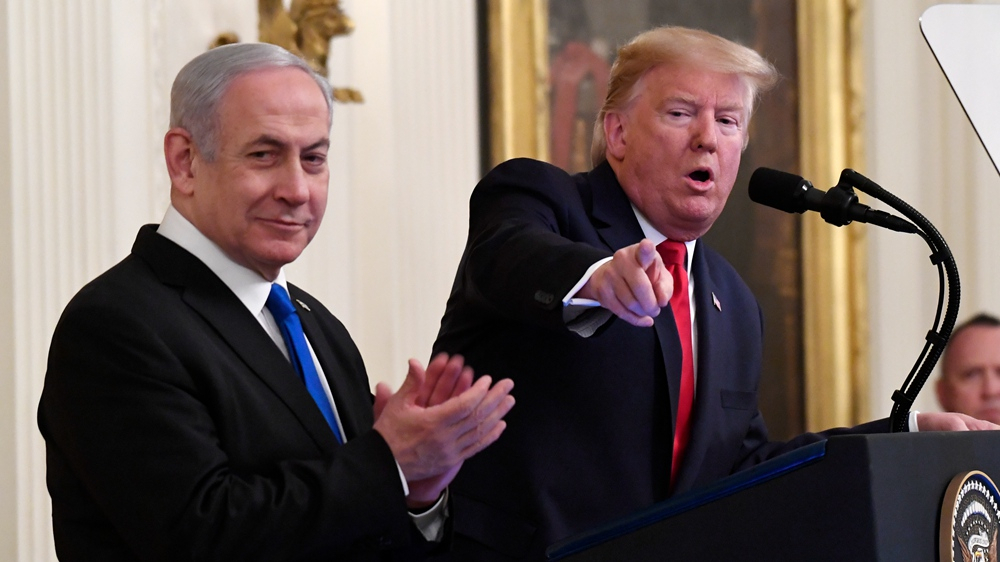
Editor's note: Guy Burton is an adjunct professor at Vesalius College, Brussels. The article reflects the author's opinions, and not necessarily the views of CGTN.
A lot of ink is being spilled over U.S. President Donald Trump's framework plan for peace between Israel and the Palestinians. Even before its details were known, a few expected that it would make too many demands of Israel, while expecting the Palestinians to accept whatever was put in front of them. Looking ahead though, the Palestinians' absence may not dissuade either the U.S. or Israel, who could press on with its contents after March, when Israel goes to the polls.
The document, titled "Vision for Peace, Prosperity and a Brighter Future," claims to offer a "realistic two-state solution," but in doing so it abandons any pretense of the U.S. as an honest broker by embracing Israeli preferences as its own.
Although the plan maintains the long-established idea of two states, it makes clear that any eventual Palestinian state will be subject to Israel's security interests. Even though a bulk of the Palestinian state would be based in the West Bank, Israeli settlements will be absorbed into Israel, while transport and infrastructure links will be built to link the fragmented territory that will make up Palestinian territory – much as it does already.
The Jordan Valley will be under Israel's control, along with Palestinian airspace and territorial waters. The Palestinian state will be demilitarized and its capital will occupy only the furthest eastern suburbs of Jerusalem, with Israel's capital based on its central and western parts.
In addition, Palestinian refugees will either be allowed to take residency in the Palestinian state or in those countries which are already hosting them or third countries that choose to participate in a refugee resettlement fund. In short, Palestinian refugees and their descendants who fled from towns and villages, that are in Israel now, will not be able to reestablish themselves there.
Palestinians' opposition to the plan is shared in the region. Some, like Turkey and Iran, have been strident in their opposition. Others, including U.S. partners like Egypt and Saudi Arabia, have tried not to dismiss the plan outright, but their support has been lukewarm at best. Meanwhile, in European capitals, the most that has been offered is to study the plan and its contents.

Palestinian protesters hold a poster showing U.S. President Donald Trump in Bethlehem, January 27, 2020. /AP Photo
Palestinian protesters hold a poster showing U.S. President Donald Trump in Bethlehem, January 27, 2020. /AP Photo
The lack of international support for the plan contrasts with the enthusiasm shown by Israel's political leaders, including Prime Minister Benjamin Netanyahu and his main political rival, Benny Gantz of the Blue and White Party. Both agree that Israeli settlements in the West Bank should be incorporated into Israel and that the Jordan Valley should be annexed.
Both Netanyahu and Gantz were invited to the White House to meet Trump before the plan was published. For Netanyahu, he hoped the meeting would help deflect attention away from the fact that he has just been indicted on charges of corruption, especially as he is his party's standard bearer for the election in March – Israel's third in the past year.
Given the consensus between Netanyahu and Gantz, it is unlikely that the plan will make much impact on the election campaign. For one, there is little appetite or interest in Israel's relationship with the Palestinians, a key political issue. For another, many Israelis already assume that much of the territory in the West Bank belongs to them, regardless of the fact that it is officially an occupied territory and not yet annexed.
For now, Gantz's Blue and White Party is leading in the polls against Netanyahu. But like the last two elections, it may well be the case that March's poll will be similarly inconclusive. Should that be the result, both candidates will compete for the support of the smaller parties, most of which are on the political right, to form a government.
Because much of the plan accords with the views on the political right and is based on the current reality, it may well be the case that among their demands will be less about the desirability of the plan's contents and more about their implementation.
Indeed, should that happen, that would mean that the plan's architects and supporters will challenge and break one of the central precepts of the peace process: namely, the abandonment of negotiations between Israel and the Palestinians as the basis of any final settlement in favor of a unilateral imposition.
To conclude, the plan therefore provides a useful cloak for the next Israeli government should it opt to establish and reinforce its sovereignty without the Palestinians. For that reason then, the Palestinians and their international supporters will need to do more than they have done till now. They will need to move beyond condemnation and diplomatic ambivalence to engage with the U.S. and Israel with their own agenda on their own terms.
(If you want to contribute and have specific expertise, please contact us at opinions@cgtn.com.)